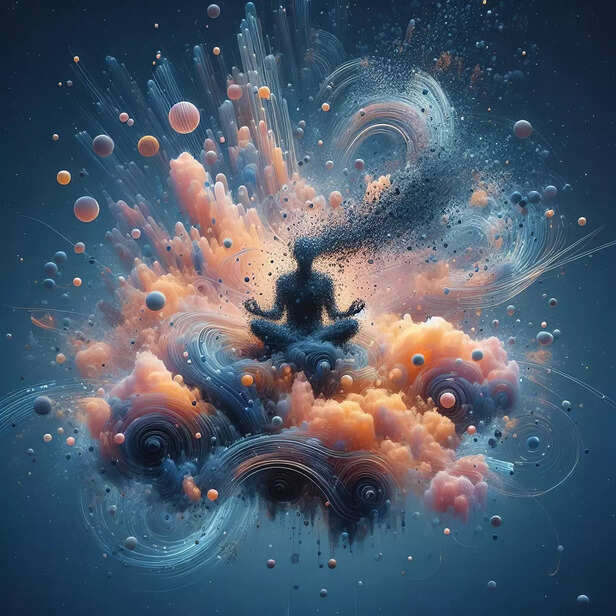Why Do We Remember Pain More Than Happiness? Gita Knows
Riya Kumari | Aug 13, 2025, 17:40 IST
( Image credit : Pixabay )
You know how people say time heals all wounds? Yeah, well, apparently “time” is that one flaky friend who promises they’ll text you back and then ghost you for three months. Because here you are, years later, still remembering that one humiliating thing you said in a meeting… but can’t recall a single compliment from the same day.
Because the mind likes to hold onto storms more than sunlight We’ve all lived this: one hurtful sentence from someone stays with us for years, but entire months of kindness blur into the background. Happiness fades, pain lingers. Not because life is cruel, but because the mind is wired to store what it fears will harm us again. The Bhagavad Gita understood this long before science explained it. Krishna tells Arjuna that both joy and sorrow are passing waves, the problem is, we stand still in the middle of sorrow and let it soak us completely, while with joy, we let it run through our fingers without much thought.
Why Pain Stays Longer

Pain forces us to turn inward. It shakes us, makes us remember, warns us to be careful next time. But often, we mistake that warning for a life sentence. We revisit our wounds, not to heal them, but to keep them alive, as if reliving the moment will protect us.
Happiness, on the other hand, feels safe. We enjoy it and move on. It rarely demands we stop everything to process it. And so it passes, leaving barely a trace.
The Gita’s Perspective

Krishna’s words cut through the noise: Pleasure and pain come and go like summer and winter. They are not who you are. When we attach our identity to either, we suffer, because seasons are not meant to be permanent.
The mind’s habit of clinging to pain is not truth, it’s conditioning. To live freely, you don’t have to erase memories. You have to stop making them the centre of your story.
The Habit of Replaying Pain

We don’t just remember pain, we rewatch it like our favourite tragic film. Every replay strengthens the emotional hold it has on us, until it becomes a familiar place we keep returning to. The Gita reminds us that familiarity is not the same as truth.
Just because a memory feels close doesn’t mean it deserves to define your present. If you must revisit your past, let it be for learning, not for lingering.
Choosing What Stays

Memories are not fixed; they are shaped by the attention we give them. If we can teach ourselves to hold moments of joy with the same seriousness we give to pain, we begin to balance the scales. The Gita calls this steadiness, the ability to remain the same in pleasure and in pain, not by numbing ourselves, but by seeing both as visitors, not owners, of our mind.
Happiness may be quiet, but it is no less real than sorrow. The choice is whether we let it fade unnoticed, or give it a home as lasting as our pain.
What This Means For Us
When you notice pain taking up too much space in your mind, pause. Ask: Is this happening now, or am I keeping it alive?
When joy arrives, notice it fully. Sit with it for a moment longer than you normally would. Let it leave an imprint. Pain may be louder, but happiness can be made deeper, if we learn to give it the same attention we give our wounds.
Why Pain Stays Longer

Memories
( Image credit : Unsplash )
Pain forces us to turn inward. It shakes us, makes us remember, warns us to be careful next time. But often, we mistake that warning for a life sentence. We revisit our wounds, not to heal them, but to keep them alive, as if reliving the moment will protect us.
Happiness, on the other hand, feels safe. We enjoy it and move on. It rarely demands we stop everything to process it. And so it passes, leaving barely a trace.
The Gita’s Perspective

Meditate
( Image credit : Pixabay )
Krishna’s words cut through the noise: Pleasure and pain come and go like summer and winter. They are not who you are. When we attach our identity to either, we suffer, because seasons are not meant to be permanent.
The mind’s habit of clinging to pain is not truth, it’s conditioning. To live freely, you don’t have to erase memories. You have to stop making them the centre of your story.
The Habit of Replaying Pain

Survival
( Image credit : Pixabay )
We don’t just remember pain, we rewatch it like our favourite tragic film. Every replay strengthens the emotional hold it has on us, until it becomes a familiar place we keep returning to. The Gita reminds us that familiarity is not the same as truth.
Just because a memory feels close doesn’t mean it deserves to define your present. If you must revisit your past, let it be for learning, not for lingering.
Choosing What Stays

Emotions
( Image credit : Unsplash )
Memories are not fixed; they are shaped by the attention we give them. If we can teach ourselves to hold moments of joy with the same seriousness we give to pain, we begin to balance the scales. The Gita calls this steadiness, the ability to remain the same in pleasure and in pain, not by numbing ourselves, but by seeing both as visitors, not owners, of our mind.
Happiness may be quiet, but it is no less real than sorrow. The choice is whether we let it fade unnoticed, or give it a home as lasting as our pain.
What This Means For Us
When joy arrives, notice it fully. Sit with it for a moment longer than you normally would. Let it leave an imprint. Pain may be louder, but happiness can be made deeper, if we learn to give it the same attention we give our wounds.
